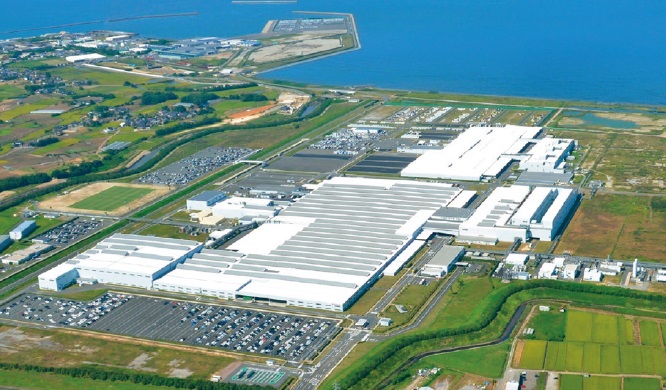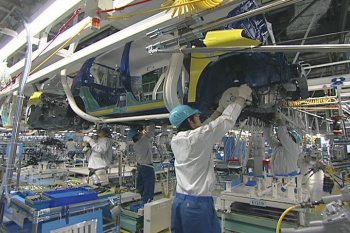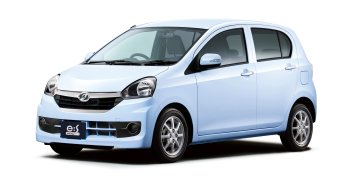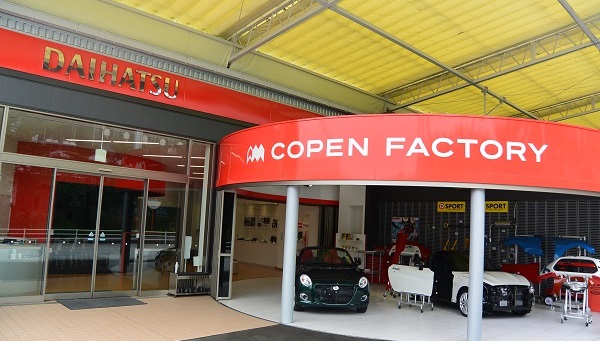Daihatsu’s plants
The key words are Simple, Slim, and Compact (SSC)
The Daihatsu Group operates four bases in Japan—Ikeda, Shiga, Kyoto, and Oita—and owns plants in two overseas countries—Indonesia and Malaysia.
At its Japanese plants, Daihatsu primarily produces mini vehicles. In order to provide its customers with high-quality products at affordable prices, it is indispensable the company maximizes quality and minimizes costs.
The key to achieving this is Daihatsu’s unique Simple, Slim, and Compact (SSC) concept.
Daihatsu makes small-size cars, and it questioned whether its plants need to be as big as those that produce large-size cars. The company has therefore focused not only on the process of making cars, but also directed its attention to the plants where its cars are made.
*1 Vehicle assembly plants
Realizing superior quality through a spirit of cooperation
 Oita (Nakatsu) Plant
Oita (Nakatsu) Plant
Daihatsu Motor Kyushu Co., Ltd.’s Oita (Nakatsu) Plant No.2 commenced operations in 2007. The plant fully incorporates the SSC concept: it occupies a site area that is half the size of previous plants, its facilities have been simplified, and its work processes integrated.
In addition to conserving resources when it comes to the materials used to make cars, Daihatsu believes that its plants and facilities ought to use only the minimum amount of resources necessary.
 A line at Oita (Nakatsu) Plant No.2
A line at Oita (Nakatsu) Plant No.2
A smaller plant size means that employees can now see neighboring work places, and this has led to a change in behavior. Indeed, a uniquely Japanese spirit of mutual help has been forged, and a manufacturing environment created in which the volume of defective products is reduced and the quality of products increased.
 Mira e:S
Mira e:S
Daihatsu’s SSC production technologies stem from its desire to become a company with a close affinity to its customers. This approach culminated in the launch of the Mira e:S in 2010, a high-quality yet affordably priced car.
Seeking to become the No.1 plant in Asia
 Karawang Plant, Indonesia
Karawang Plant, Indonesia
 PGMSB, Malaysia
PGMSB, Malaysia
The expertise that Daihatsu has cultivated in its production of mini vehicles in Japan has been optimized for local markets and applied overseas.
It is possible to create plant facilities overseas that are similar to those used in Japan; however, Daihatsu believes it important that not only its facilities but also its approach to manufacturing is carried over.
When establishing Perodua Global Manufacturing Sdn.Bhd.(PGMSB) in Malaysia, Daihatsu invited local employees to Daihatsu Kyushu in Japan to undergo training. There, they not only received technical instruction, but also learned about Japanese culture and about the Japanese approach to manufacturing. After returning to Malaysia, these employees have applied the lessons they learned to carry out manufacturing at a high level.
Developing people and plants in Daihatsu’s unique style: this is another of Daihatsu’s strengths.
Going forward, Daihatsu believes it has a responsibility to provide high-quality, affordably priced cars to its customers in fiercely competitive emerging markets, and to contribute to the development of automotive industries in these countries.
A plant designed to establish close ties with customers
 Copen Factory
Copen Factory
Daihatsu operates the Copen Factory at its Head (Ikeda) Plant.
This factory is distinct from the company’s other plants, in that it has been designed to resemble a showroom; members of the general public are able to participate in factory tours, while customers who have made reservations to purchase Copens can see the process by which their cars are made.
By enabling customers not only to drive their cars but also to observe how their cars are made, Daihatsu seeks to create a greater sense of affinity between its customers and their cars.
The Copen Factory is the first Daihatsu plant to use 3D cameras and other cutting-edge technologies to guarantee product quality. As far as manual processes are concerned, employees are hand-picked from Daihatsu’s workplaces and devote themselves to creating each individual Copen unit.
Being observed by customers gives rise to a positive nervous energy among employees, and motivates them to take pride in their work by recognizing that the factory is a key component in the shaping of the Copen brand.
Through its Copen Factory, Daihatsu hopes to enable as many customers as possible to witness first-hand both its desire to provide high-quality products and its approach to manufacturing.